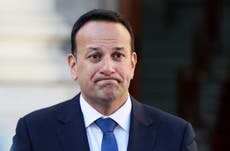Theresa May can’t be trusted with Brexit – but Jeremy Corbyn needs to start acting like part of the solution
May should start talking to the leader of the opposition. And he should concentrate on not appearing infuriatingly vague
Her Majesty’s government enjoys the confidence of the House of Commons. It certainly doesn’t seem to be enjoying very much else.
Something profound has overcome British parliamentary politics in recent weeks. The government has, very gradually, lost control of its European policy. Though dramatic, the historic defeat on the prime minister’s deal merely drew attention to the fact.
The prime minster herself acknowledged as much when she offered to “listen” to what the Commons said, loud and clear. She has offered to reach out to the “senior parliamentarians” in other parties. In effect, as regards European policy, a new parliamentary grouping is taking shape. It is cross-party, it is seeking consensus, it is looking for a practical, workable way forward that will command the confidence of the house but which will also be acceptable to the European Union.
In a sense we have a new cabinet – sitting on the backbenches. Former education secretary Nicky Morgan is a sort of shadow prime minister. She has in her ambit some able minds: Oliver Letwin, Nick Boles, Yvette Cooper, Vince Cable and many others, in varying degrees of proximity. They are very much against no-deal Brexit – and probably command a huge majority in the Commons for that view. In due course they will prevail.
They are also, perhaps, itching towards an alternative “soft Brexit” policy based on the Norway example, with the UK also in the EU customs union as well as the single currency.
Technically it counts as Brexit, in that the UK would be out of the EU, though inside the European Economic Area and, possibly, the old European free trade area. It is the sort of deal that Brussels might well countenance, and grant a delay to Article 50 to achieve. The withdrawal agreement and future trade treaty could be settled in one go. Under certain circumstances it would solve the Irish border issue, as well as bestowing economic benefits.
Rationally, it is inferior to staying in the EU on existing terms, because the UK becomes a rule-taker not rule-maker, and the first EU colony. It is probably not what “Brexit” means.
What Theresa May has tried to do is consult the leader of the opposition, Jeremy Corbyn, as well as the other party leaders. But Mr Corbyn is insisting that she rules certain options out.
Yer what is Mr Corbyn’s policy? If we were to have the general election he so desires, what would appear in the Labour manifesto?
Mr Corbyn was directly challenged on this point in the Commons by Pete Wishart of the SNP during the no-confidence debate. The Labour leader had two answers, both deeply disturbing. First, he said that the Labour Party was a democratic party and would decide its policy through democratic means. Full stop. It could, presumably, be pro- or anti-Brexit; pro- or anti-referendum; pro- or anti-immigration. It is up for grabs. Ms May’s policy may be a dead deal, but at least it is there, in all of its detailed glory.
Second, Mr Corbyn offered some principles. As ever, he wishes for the UK to be in “a” customs union with the EU and to have access to the single market. Fantasy. It is merely another version of the “cake and eat it” approach adopted by many of the dreamers in the Commons, in every party. There is no prospect of the EU entertaining Mr Corbyn’s proposal. The EU has never granted any third-party nation the right to attend and agree on EU trade deals with the rest of the world. It does not even do that for individual member states. Why, one asks, is Barry Gardiner, as Labour’s international trade secretary, going to be tagging along with Michel Barnier in Beijing or Delhi, while the German, Spanish, French, Czech or Bulgarian trade ministers are not invited along? Mr Gardiner, as is now well known, has a special word to describe the credibility of Labour’s policy on trade deals, and it doesn’t inspire confidence.
Nor has any customs union ever been devised where a member can simultaneously conclude individual trade deals with other countries with the option of imposing a common customs union external tariff on imports, or its own tariff. Ms May tried to sell such “facilitated customs arrangement” in her Chequers paper; the EU told her it was unworkable.
And if we wish to have access to the single market, do we then accept free movement of workers into the UK from the EU, as is the EU’s “red line” policy? We do not know what Mr Corbyn even wants.
Worse, even than all of that, Mr Corbyn cannot bring himself to back the one thing that his MPs and members do unequivocally want to see – a second, Final Say, referendum on Brexit. He seems to want to engage in endless parliamentary stunts and manoeuvres – even successive votes of no confidence – in an attempt to destabilise the May government and force an election. It will not work. It wastes the country’s time. It is wasting his party’s time. He is betraying the national interest.
Ms May has made a botch of things, but she is right when she accuses the Labour leadership of similarly pursuing a blatant party political purpose.



Join our commenting forum
Join thought-provoking conversations, follow other Independent readers and see their replies